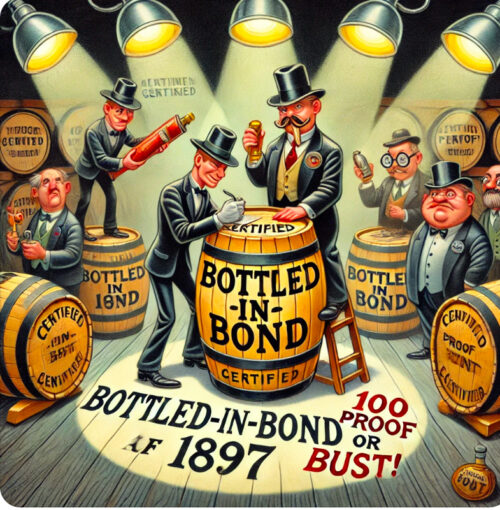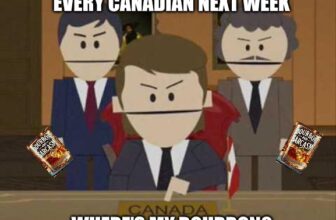
The ever so elusive “Bottled in Bond” whiskey—because nothing says “premium” like a government-mandated label. It sounds fancy, it sounds official, and it makes you feel like you’re about to sip something that could only be crafted by distillers who wear monocles and recite Shakespeare. But before you plunk down your cash, let’s take a look at the truth behind the label, shall we? Spoiler alert: It’s not as glamorous as you think.
Pro: The Legally Defined Standard of Quality
Because who doesn’t love a little government oversight with their liquor?
Let’s start with the facts. The “Bottled in Bond” label isn’t just for show—it’s actually a government-regulated designation that means the whiskey has to meet certain requirements under U.S. law. It’s like a certificate that says, “Hey, we followed the rules, so here’s your official stamp.” You’ll get:
- 100 proof (because why settle for anything less when you can go full force).
- Made in a single distilling season (so it’s at least not a weird patchwork of old and new stuff).
- From a single distillery (so it’s not a blend of who-knows-what).
- Under federal supervision (because Uncle Sam loves to make sure your whiskey doesn’t taste like gasoline).
Examples of brands that proudly carry the “Bottled in Bond” seal include:
- Evan Williams Bottled in Bond – If you’re looking for a whiskey that tastes like it was produced with slightly more care than a bottle of well whiskey at a dive bar, this one’s a classic. You get that 100 proof punch, but let’s be real—it’s still Evan Williams. Not exactly “high society.”
- Old Forester Bottled in Bond – Ah, the perfect choice if you want a whiskey that technically meets all the requirements but still tastes like it was made to be mixed into a cocktail, not sipped neat. A little spicy, a little woodsy, and a lot of “meh,” if we’re being honest.
- Henry McKenna Bottled in Bond – Now we’re talking! This one’s a fan favorite and arguably the best of the bunch, often getting praised for its rich, complex flavor (because, you know, sometimes the rules actually work out). But don’t get too excited—it’s still a bonded whiskey, which means it doesn’t have to be a unicorn.
Con: Doesn’t Mean It’s Actually Good—It Just Means It’s Legal
Because “compliant” doesn’t always mean “spectacular.”
Just because it’s “Bottled in Bond” doesn’t mean it’s the greatest thing since sliced bread. It just means the distillery followed some regulations. It’s like when you pass your driving test—congratulations, but you’re still not a Formula 1 driver. The “Bottled in Bond” label guarantees compliance with the rules, but it doesn’t guarantee that the whiskey will be any good.
Take Evan Williams Bottled in Bond, for example. It’s legally bonded, yes, but it’s still… well, Evan Williams. For around $20-$30, you’re getting a reliable, middle-of-the-road pour that won’t offend anyone at a casual gathering. But don’t expect it to wow you. It’s like getting a “best effort” trophy in a contest where everyone’s a loser.
Pro: 100 Proof—Because Subtlety Is Overrated
Is it whiskey, or is it napalm?
The “Bottled in Bond” rule requires a minimum of 100 proof, which means this stuff packs a punch. If you like your whiskey with a healthy dose of “please don’t try this at home,” then this is your kind of label. The burn is real, but hey, sometimes you need a drink that reminds you you’re alive.
If you’re really into that 100-proof lifestyle, you could try something like Old Forester Bottled in Bond. This one clocks in at a solid 100 proof and gives you a nice, full-bodied experience. But be prepared for a hit of alcohol that might make you question why you didn’t just stick with beer.
But remember, 100 proof doesn’t always mean better—just stronger. If you’re more into smooth sipping with a delicate profile, you might want to think twice. Your taste buds might stage a protest.
Con: 100 Proof Doesn’t Mean High Quality—It Just Means More Alcohol
More proof = more alcohol = more regret.
Sure, a higher proof can be great for those who enjoy the sensation of whiskey searing their throat, but it’s not automatically a sign of quality. Take Henry McKenna Bottled in Bond, a well-regarded whiskey at 100 proof. It’s got a depth and richness that actually balances the strength, making it one of the better “Bonded” options out there. But let’s be honest: There’s a reason it’s $50+, and that’s not exactly “cheap and cheerful.” You can find good whiskey at lower proof, too—so don’t let the alcohol content fool you into thinking you’re getting something great.
Pro: Transparency—Because Who Doesn’t Love a Little Label Clarity?
Ah yes, knowing exactly what you’re drinking… even if what you’re drinking is just fine.
One of the few things that’s actually useful about the “Bottled in Bond” label is that it gives you clarity. You know exactly what you’re getting because the regulations are very clear. It’s not some cheap knockoff or mystery blend. You know it was distilled in a single season, at a single distillery, and bottled at 100 proof.
The transparency here is nice, even though it doesn’t always mean the whiskey is amazing. It’s like ordering a steak at a chain restaurant and knowing exactly what cut you’re getting… and then realizing it’s a steak, but not the best steak.
Con: Distillers Can Abuse the Label to Sell You Mediocrity
Just because it’s “compliant” doesn’t mean it’s spectacular, which now kinda reminds me of my dating history…
Some distilleries love to use the “Bottled in Bond” label as a way to push their mediocre products with a “legitimate” stamp of approval. It’s a little like buying a Gucci belt and realizing it’s made of pleather. Take Evan Williams Bottled in Bond, for example. It’s perfectly fine. But it’s not the crown jewel of the whiskey world. Distillers can use this label to hide behind a legal designation that makes you think it’s better than it really is. They’ve met the standards, so you can sit there and feel all fancy—meanwhile, it’s still just Evan Williams in a slightly more dignified bottle.
Pro: A Historical Throwback—For Those Who Like Drinking History
It’s like sipping whiskey with a side of 19th-century nostalgia.
“Bottled in Bond” is steeped in history. It was created during a time when whiskey was as wild as the Wild West, with adulterated spirits and all sorts of unregulated chaos. So, if you like the idea of drinking something that’s been distilled under government supervision for over a century, that’s kind of cool. It’s a direct link to a time when whiskey was more about survival than sipping.
But don’t let that fool you into thinking that “Bottled in Bond” equals premium. A historical throwback can still be stuck in the past, just like the 1980s mullet you thought was a good idea.
Conclusion: Should You Buy “Bottled in Bond” Whiskey?
If you want a whiskey that’s technically compliant, offers a consistent experience, and has a healthy dose of history, then sure, “Bottled in Bond” might be for you. Henry McKenna Bottled in Bond is a prime example of one that actually lives up to the label, but even then, it’s not going to make you weep with joy. On the flip side, if you’re just looking for a whiskey that’s actually high-quality and might change your life, well, you might want to look elsewhere.
Don’t get caught up in the label. “Bottled in Bond” doesn’t guarantee a top-tier drinking experience—it just guarantees that the distillery followed the rules. And let’s face it, sometimes following the rules is the bare minimum. You’ll still have to take a risk and hope the whiskey actually delivers on that legal promise.
So, next time you see a “Bottled in Bond” label, remember: it’s not a badge of ultimate quality. It’s just a legal stamp that says, “We followed the rules, and here’s your 100-proof reality check.” Drink responsibly—or, at the very least, drink knowingly.




